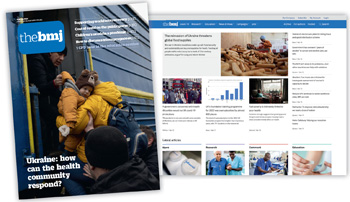
Talk for long to Kamran Abbasi, editor-in-chief of The BMJ since January, and you can’t help thinking now is both the best of times and worst of times to be a medical / science publisher. On the one hand, demand and need for factual, accurate information has never been greater. On the other, the misinformation scourge seems worse – and harder to solve – than ever before.
Either way, The BMJ stands at a unique point in its 182 year history. And Abbasi’s vision for the future of the general medical journal where he has worked on and off for 25 years, is closely shaped by both.
“Now is a very exciting time to be in medical publishing. The world’s in crisis and the pandemic has shown there are a very large number of people who want trusted reliable information and evidence, and they want to go to sources they can believe in, have faith in, and rely on,” he says.
For this reason, people have been turning to The BMJ in growing numbers. UK circulation of the print title – comprising three editions (two weekly, one monthly) for British Medical Association members – is a stable 122,000. But the online publication www.bmj.com – to which content for an international readership is published constantly – has, says the BMJ, seen monthly active users grow from 22 million in 2019 to 31 million in 2020 and 49 million last year.*
The world’s in crisis and the pandemic has shown there are a very large number of people who want trusted reliable information and evidence.
BMJ’s mission
This has been driven by demand for accurate pandemic-related information, the light the crisis has shone on how health relates to broader society, and The BMJ’s position on both – which is underpinned by a clear mission: to work towards a healthier world for all.
“We are a little different to other medical journals in that we combine different types of content – as well as research and clinical content, we have journalism, and now an opinion section. We work hard to publish to the highest possible standards in each area,” Abbasi explains.
“The situation the world is in today has reinforced the importance of high-quality science, adding value to the research that we publish, ensuring all our clinical content is the most relevant and highest quality, and achieving a standard with our journalism so it is as factually-based, accurate, and high quality as any newspaper.”
The opportunity for The BMJ does not stop with the pandemic, however. Its continued importance will likely be assured by ongoing challenges of this pandemic and future pandemics, climate change, the ageing population, and multi-morbidities.
“As health continues to demand more and more of our attention, then the role of medical journals is, I think, a very big and important one,” he says.
“The world needs to change to prioritise outcomes related to health and wellbeing. That’s simple to say and hard to achieve. But I think more people are attracted to the idea of changing the world in this way. And having that the central argument we are focusing on makes us think much more broadly about our agenda.”
Indeed, health outcomes are more broadly-based than the health sector.
“You need to think about the wider and social determinants of health and the different methodological approaches that allow you to answer research questions that are transdisciplinary. You need to embrace the new technologies of artificial intelligence, machine learning, and real-world data,” Abbasi continues.
“And ask yourself: am I delivering the best information to the people making decisions about people's health around the world?
“In all we do, we absolutely stand by our values to make sure what we publish is evidence-based, patient-centred, open and transparent, and courageous. Being able to speak truth to power is important to us – something we’ve been able to do in a way that some other publications haven’t – and we will continue to do so.”
We absolutely stand by our values to make sure what we publish is evidence-based, patient-centred, open and transparent, and courageous.
The international opportunity
Two big, interrelated challenges are how best to continue with what The BMJ does in the UK (where it is published in print) while continuing to grow what it does internationally, digitally, with limited resources.
Work has been underway for some years to grow international reach. And as The BMJ has grown internationally online, the print publication has grown stronger by being more UK-focused – which, in turn, helped attract more people during the pandemic.
Now, however, the plan is to take The BMJ’s international content to the next level.

Digital is where all journals are going to have to accelerate change. And Abbasi highlights the need to reassess platforms and editorial thinking: to be open to new digital formats, to further embrace multimedia, and to adapt current article formats in new ways to be more consumable and shareable online.
“We already offer more variety than most medical journals online – many of which are still re-publishing print articles digitally, which is no longer fit for purpose. But while we have always been a pioneering journal digitally, we have a long way to go to be in the same place as many non-medical non-science publishers,” he says.
“We need to get much closer to those outside the science and medical publishing arena – like The Guardian, The Economist, the New York Times. It’s an ongoing project since the digital environment changes weekly. But it will take the next two to three years to really bring about some major changes to bmj.com.”
International growth is driven by publishing relevant content and making it accessible and available, which involves overcoming certain obstacles. Even so, The BMJ is better-positioned than many.
“One obstacle is having a clear vision of what are you trying to achieve as an editorial group, which I think we have. Another is overcoming the inertia that exists in medical publishing – the belief that not much has to change for publishers to remain successful,” Abbasi says.
Also important will be to invest in the strong team the title already has to ensure people are appropriately trained and upskilled to take advantage of the opportunities that are emerging.
“At the heart of all this is how do we best serve our readers? How do we best deliver content online? How do we understand the behaviours and preferences of our readers?” he stresses.
“I don’t think medical journals are very sophisticated in this area and they need to be. Readership is growing, use of the internet is growing, and you need to really understand the different sub-populations that come to your website if you are to serve them well by helping improve patient care and creating a healthier world.”
The plan is to take The BMJ’s international content to the next level.
Tackling misinformation
The pandemic has also highlighted the danger of misinformation – another big challenge, and an issue brought close to home last year when The BMJ locked horns with Facebook after one of its investigations was censored and some readers attempting to share it socially were warned by the platform not to.
The BMJ’s investigation reported poor clinical trial research practices occurring at a contract research company helping to carry out a Pfizer Covid-19 vaccine trial. After a third-party fact-checker working for Meta / Facebook flagged it – despite failing to identify any factual errors – The BMJ tried to challenge this, but without success.
“We wrote them an open letter and had no response,” Abbasi recounts.
“We’ve been trying to get that label removed but have got nowhere. We wanted to appeal to their oversight board but apparently do not fit the criteria to appeal. We have reached an impasse, whereby an article that was fully fact-checked and explored an important issue of research misconduct remains censored.”
Facebook’s fact-checking service didn’t understand “the very simple point that” participants in trials are vulnerable and need protection, and that conduct of clinical trials needs to be robust and ethically sound, he says.
The BMJ’s primary intention was to highlight that the trial wasn’t being conducted properly, and that it required further investigation.
“It wasn’t a comment on the outcomes they were assessing in that particular trial,” Abbasi stresses. “It's best to be honest and transparent about the problems in the conduct and reporting of clinical trials because ultimately that’s what builds trust in society about implementing the findings of medical research.”
Meta / Facebook’s unwillingness to listen and understand why it was legitimate and important to publish on this issue, and how they made a mistake with their fact-checking, shows how “arrogantly powerful” social networks have become and how powerless the rest of us are, he believes. And that’s a real concern.
“Think about the really troubling information shared on social media platforms that gets through without a second look, is widely disseminated, shared and believed,” Abbasi continues.
“Then think about how it is possible that a trustworthy publisher like The BMJ has published an article on a very serious matter that has been thoroughly fact-checked and edited with care and attention to detail, and how it has ended up falling foul of Meta and Facebook’s fact checking for reasons that don’t stand up.”
When the power of controlling information rests with “organisations that clearly are not responsible enough to wield that power”, he believes: “society is in a very bad place”.
It is, of course, very hard for an individual publisher to tackle misinformation – or unreliable information about what they have published – because there is so much of it, so much of it is on social media, and any attempt to engage on social media to correct something risks attracting more attention to the misinformation.
But what a publisher can do is to provide information that is reliable.
“Let’s stand up for the information that is reliable, the evidence that is trusted – let’s publish it,” says Abbasi.
“We have our own BMJ fact check, our own briefings. Our way of countering misleading information is to publish our own information that we believe to be reliable and trustworthy. And that’s what we are best at. We can control that information.”
One route forward might be closer collaboration between publishers against misinformation. Another is encouraging wider understanding of the nature of science-based publishing.
“If you have dealt with science and evidence for long enough, you understand that none of the science published by any medical or science journal is perfect,” he says.
“Nothing you publish is absolute – people will interpret it in different ways. They will ask different questions about the methodology and the interpretation. They will want to re-analyse the data, replicate the study. Publication is not the final word in any story, just part of an ongoing debate.”
I don’t think medical journals are very sophisticated in this area and they need to be.
What does the future hold?
Looking ahead at the prospects for medical and science-based publishers, Abbasi is hopeful.
“Years ago, we had many conversations about the future of publishing. Where’s research going to end up – will it end up on large databases and what will medical journals publish? Will print disappear? And we are still publishing research and still have a print edition,” he points out.
“The world will change – it has already with the success of preprint servers (platforms hosting preliminary versions of scientific manuscripts so researchers can share research pre- peer-review and publication in academic journals). But this hasn’t obviated the importance – or need – for medical and science journalists, because the amount of information is overwhelming and people still need someone to make sense of it for them.”
Abbasi adds: “While journals can still add value to the research they receive – making it more useful, presenting it in the most accessible way, and peer reviewing it thoroughly – they will still have a role.” So long as they are adaptable and flexible to the new possibilities that arise, of course.
Pessimists might focus on how society has become rampant with misinformation, superficial coverage, and unreliable information. But there are places to go for information to help create a healthier population and planet. “The BMJ is one of those places,” he says. “And, under my editorship, it always will be.”
Publication is not the final word in any story, just part of an ongoing debate.
* These figures were updated on 13 May 2022.
This article was first published in InPublishing magazine. If you would like to be added to the free mailing list, please register here.










